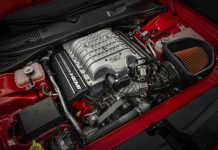Automakers will face steeper penalties if they fall short of annual U.S. fuel economy targets after a federal court blocked a Trump administration move to delay a scheduled increase in the fines, handing a victory to environmental groups and several states.
The ruling by a federal appeals court in New York overturned a National Highway Traffic Safety Administration decision last July to indefinitely delay a rule to more than double the value of the fines from taking effect. Several states including New York, California and Vermont sued and alleged NHTSA’s move was unlawful. Environmental groups also sued the Trump administration over the delay.
Since the mid-1970s, automakers have been fined $55 for each mile per gallon they fall short of annual Corporate Average Fuel Economy targets set by NHTSA. Those fines are multiplied by the number of vehicles sold in a given model year.
Congress in 2015 instructed all federal agencies to update their civil penalty formulas to reflect inflation, and NHTSA proposed to increase the fine to $140 per mpg shortfall, per vehicle sold. That higher penalty rate is now in effect due the ruling, Amy Spitalnick, a spokeswoman for New York Attorney General Eric Schneiderman, said in an email.
“The fuel efficiency standards penalty rule is a common sense measure that would protect consumers’ pocketbooks while reducing the carbon emissions that harm our health and drive climate change,” Schneiderman said in a statement. “As we’ve proven again and again, when the Trump administration puts special interests before public health and our environment, we’ll take them to court — and we will win.”
A Transportation Department spokesman did not reply to an email seeking comment.
Companies have paid more than $890 million in the penalties since they began, with some luxury vehicle brands paying the most historically. Tata Motors Ltd.’s Jaguar-Land Rover brand paid more than $14 million in penalties stemming from its 2013 model year light trucks, for example.
NHTSA earlier this month proposed canceling the steeper penalties altogether. Spitalnick said New York will take action to block that rule if and when NHTSA finalizes it.
Environmental groups including Natural Resources Defense Council and the Center for Biological Diversity praised the court’s decision to overturn the delay.
“The updated penalty impels automakers to clean up their fleets, rather than offering them a cheap license to burn more gas if they fail to keep pace with fuel economy targets,” Irene Gutierrez, an NRDC attorney said in a blog post. “There is no reason to give automakers a cheap way out of compliance with the standards.”











Please!!! Don’t “protect” my pocketbook. I can’t afford that!
“The fuel efficiency standards penalty rule is a common sense measure that would protect consumers pocketbooks…” wow, what planet are these people from? So to save a few bucks on gas the cars are made so ridiculously over complicated that the cost of any repairs, maintenance, and the initial cost of the car itself far outweighs the puny gas savings. I’d rather have a guzzling V8 that can accelerate and climb hills without breaking a sweat than a turbocharged 4 that’s running flat out and will burn itself out prematurely. Sounds like the very definition of penny wise and pound foolish, but Uncle doesn’t care since it’s not his money.
If they really wanted to “protect” our pocketbooks they would have allowed the market to do the job. But that isn’t it is it?
My guess, the price of cars would have come way down, like computers did, instead of largely doubling over the last five decades.
The NHTSA doesn’t want the gravy train to stop. I hope Trump doesn’t back down from this.
Gee, why does anyone think that these penalties are in any way effective? I see Jags and other “gas guzzlers” all over Aspen, and I’m quite certain no one cared that they had to pay more.
But that’s the goal, isn’t it? Make the luxury of a powerful automobile unaffordable to the masses so that the rich bastards can have something we don’t. Eric always points out the 0-60 times of basic Japanese sedans are in line with 1970s muscle cars. Ditto interior and comfort options. And if they feel guilty, well they can always drive the (taxpayer subsidized) Tesla in the other bay.
They can’t come out and outright ban these vehicles that they don’t want us to have, since people would at that point protest it. Banning is what they really want, don’t think they wouldn’t if they could get away with it. Well banning them for us anyway.
So they make it so only the wealthier can afford them by taxing and regulating them. You can only have them if you can come up with the extra money. That is only allowed so they can continue to be driven around in them. Because that would be the other thing about banning them outright, they couldn’t have them either. And you know they are always special, they get to have them. So they slowly disappear, only noticed by people like us.
Though at some point, I am guessing, vehicles like the Chevy Tahoe and Dodge Charger will be restricted to government sales only. We have had a taste of that in the last version of the Chevy Caprice, which could only be bought by police departments (I looked into seeing if they would sell as a fleet sales, nope, no dice). GM shut down the few dealers that dared to sell them new to private individuals. What kind of company stops people from buying their products. Well, Government Motors does.